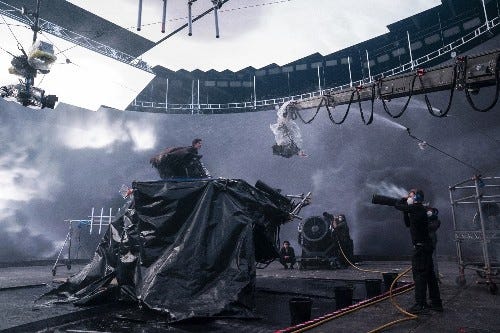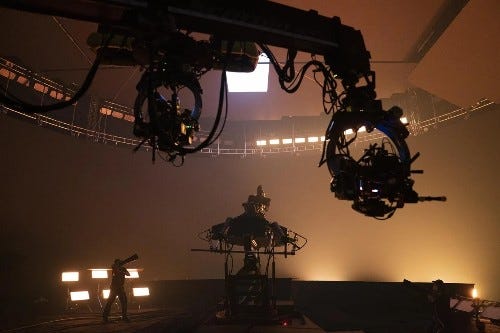Bristol movie makers land a flight of dragons
The cutting edge technology behind Game of Thrones spin-off House of the Dragon comes to the city in boost for local production industry

MAGIC is a high-tech endeavour these days; at least it is in the movies. But we're not talking the spell-casting kind of sorcery, here, rather the imaginarium of worlds.
There's more to special effects wizardry than uttering some arcane incantation while waving a wand; although the code and algorithms at the heart of modern computer-generated imagery (CGI) might seem rather esoteric.
More than code alone, though, it's the hard technology that immerses us in the make believe sufficient to suspend our disbelief; as true for audiences, as it is for the actors – and crew – turning illusion into realistic performance.
Down in Bristol, a project is taking this pretty much to heart, with the installation of some cutting edge world-building technology.
Earlier this year, a new virtual production stage that uses CGI to help create the scenery was installed at a facility in the city's Temple Quarter, alongside a smart cinema said to be one of a kind; one that can measure what the audience is feeling.
The project is the brainchild of a team from Bristol University, working with Lux Machina Consulting; the company behind the technology that brought dragon flight to life in the Game of Thrones spin-off, House of the Dragon.
This virtual production stage takes the place of green screens, so instead of the scenic elements being added during post-production, the actors and directors see ‘live’ dynamic LED backdrops of where the story takes place; it adds an extra layer of 'realism' to enhance their performances.
The new specialist facilities, located in the Coal Shed, are being built by the university as part of its MyWorld programme, a £30 million initiative funded by government agency, UK Research & Innovation's (UKRI) Strength in Places fund.
The new facility which consists of a 35 seat Smart Cinema equipped with a range of monitoring technology, alongside an experimental studio, is due to open this Autumn. It has been designed to allow those in the creative industries to experiment and innovate alongside internationally renowned academics, to change the way the film, TV and games are created, broadcast and experienced by everyone.
“The partnership with Lux Machina is a critical element in our mission to combine world leading research and teaching with the latest in production facilities,” said Oscar De Mello, operations director, MyWorld, at the University of Bristol.
“Our Experimental Studio and Smart Cinema will enable a huge variety of partners, from global leaders like Netflix and Amazon to Bristol’s amazing indie and freelancer community, to access the tools, data and talent they need to safeguard and grow their businesses, to develop and validate new technologies and create new content.”
“We’re excited to partner with MyWorld to bring virtual production to the University of Bristol, one of the leading creative hubs in the UK,” said David Elliott, Lux’s producer on the project. “This new stage and wider facility, empowers new creatives to break ground in ICVFX and beyond.”
Ben Lumsden, now of Dimension Studio, formerly of Epic Games and makers of Fortnite, said: “I think this facility will drive more people from the creative industries to come and play here in Bristol and that represents a really exciting opportunity for the broader creative industries.”


MyWorld aims to boost the regional economy by £223 million GVA (Gross Value Added) by 2030. The investment in the programme, including the £3.6 million contributed to The Coal Shed, are said to be indicative of the importance of the creative industries to the UK economy, which add £124 billion of value to the UK economy per year.
As well as the £1.2 million virtual production stage, the new facility will support motion capture technology – the kind used to bring Gollum to life in Lord of the Rings – as well as volumetric capture, and a soundstage for live TV broadcast, alongside audio-visual galleries, edit suites and training rooms.
“The Coal Shed will be a space where world-leading research will co-locate alongside, collaborative R&D and training, with our courses targeted at those under-represented in the creative sector,” said professor David Bull, MyWorld’s programme director.
This means that we will not just be driving innovation, we will also be satisfying skills needs and enabling a more inclusive industry and regional economy.”
Lauren Paul, VP business development at Lux Machina, added: “One of the things I get most excited about is working with universities and research programmes around the world as they expand their reach into virtual production.
“By making innovative and industry-leading technologies accessible, we help unlock the next generation of masterful technical and creative minds. It’s clear MyWorld and the University of Bristol are helping to lead this charge in the UK.”
Earlier this year, Bristol was awarded the prestigious City of Film Award during the Cannes Film Festival, so it's kind of fitting that this movie-making technology is deployed there to work its magic.
MC




